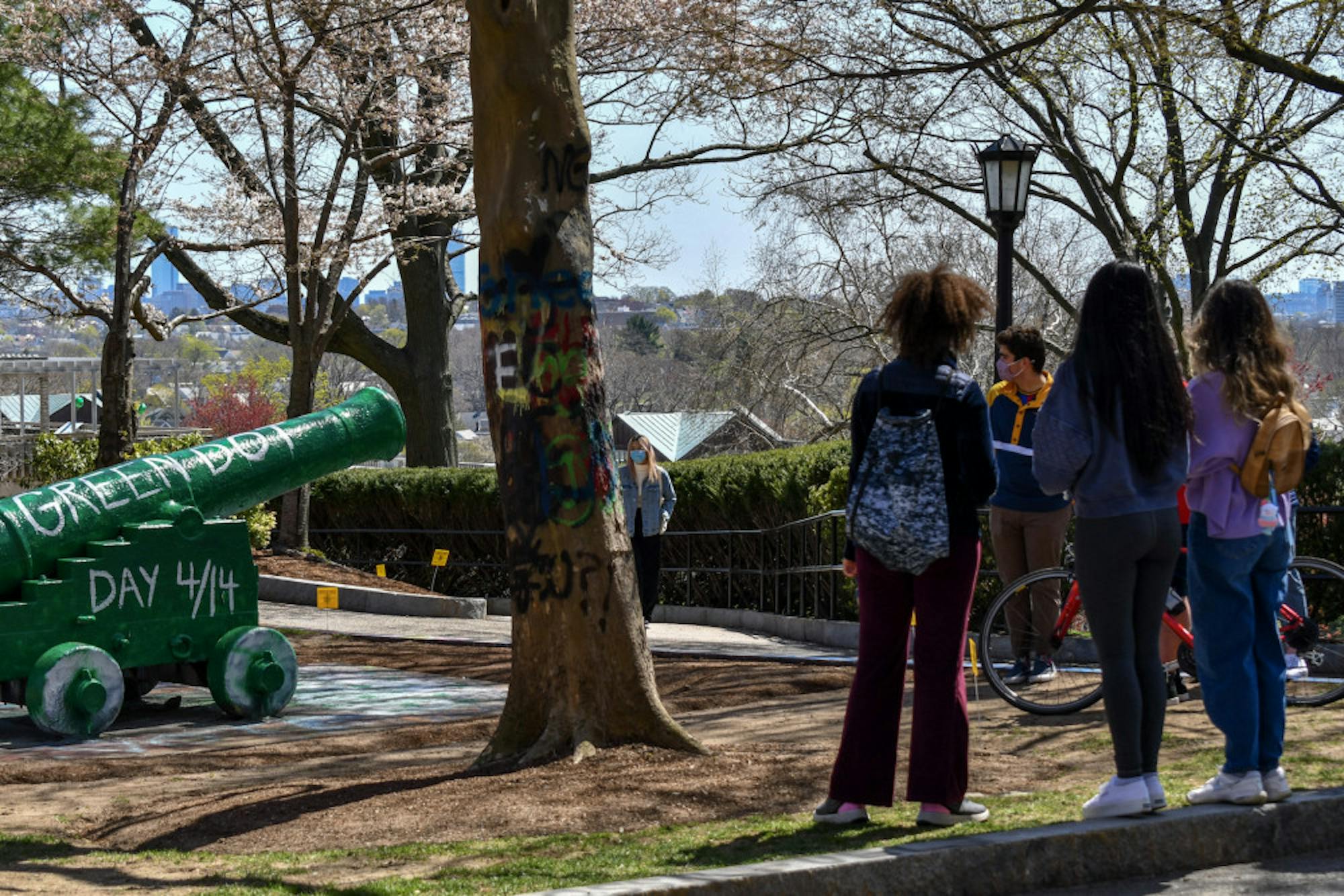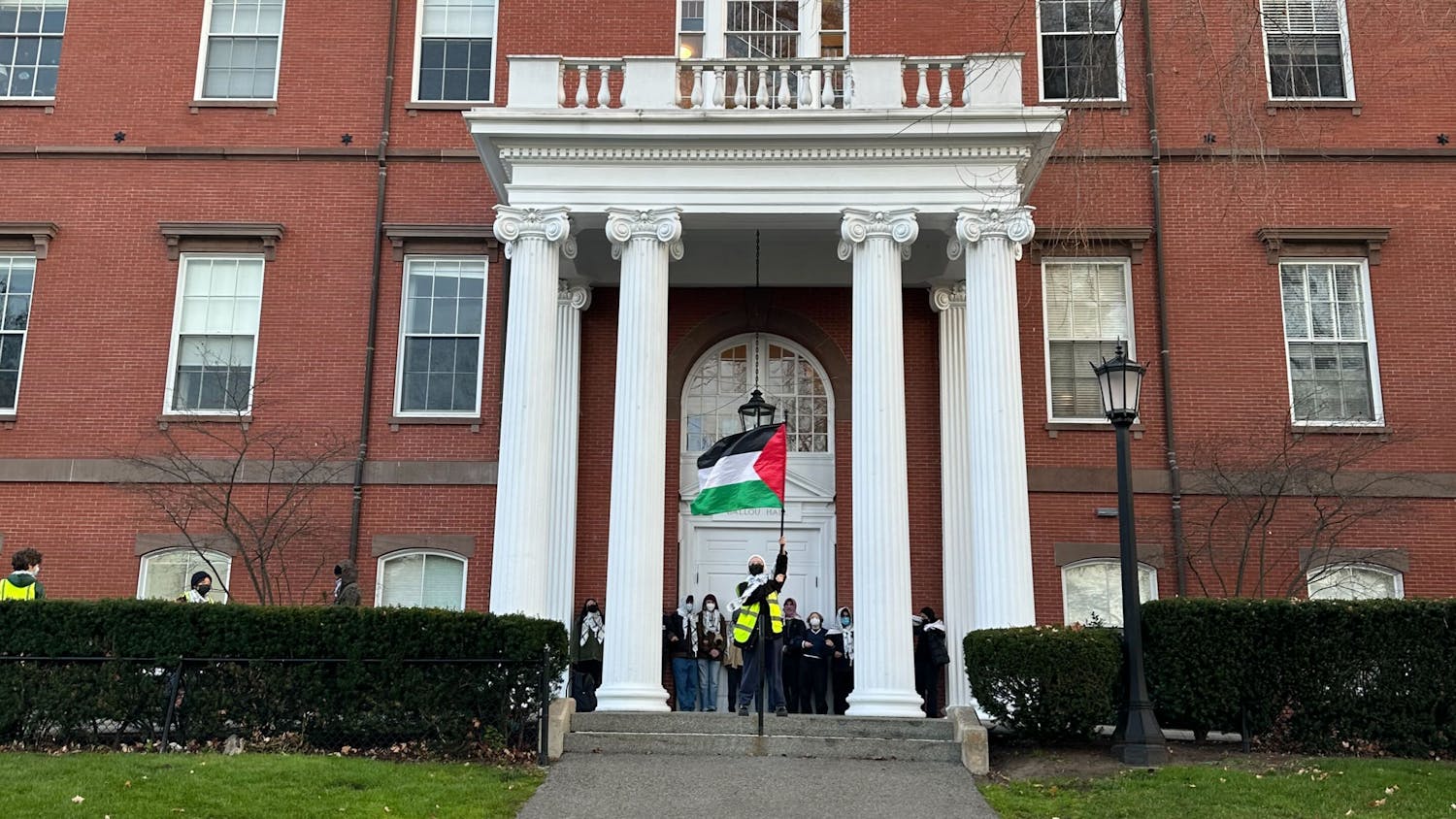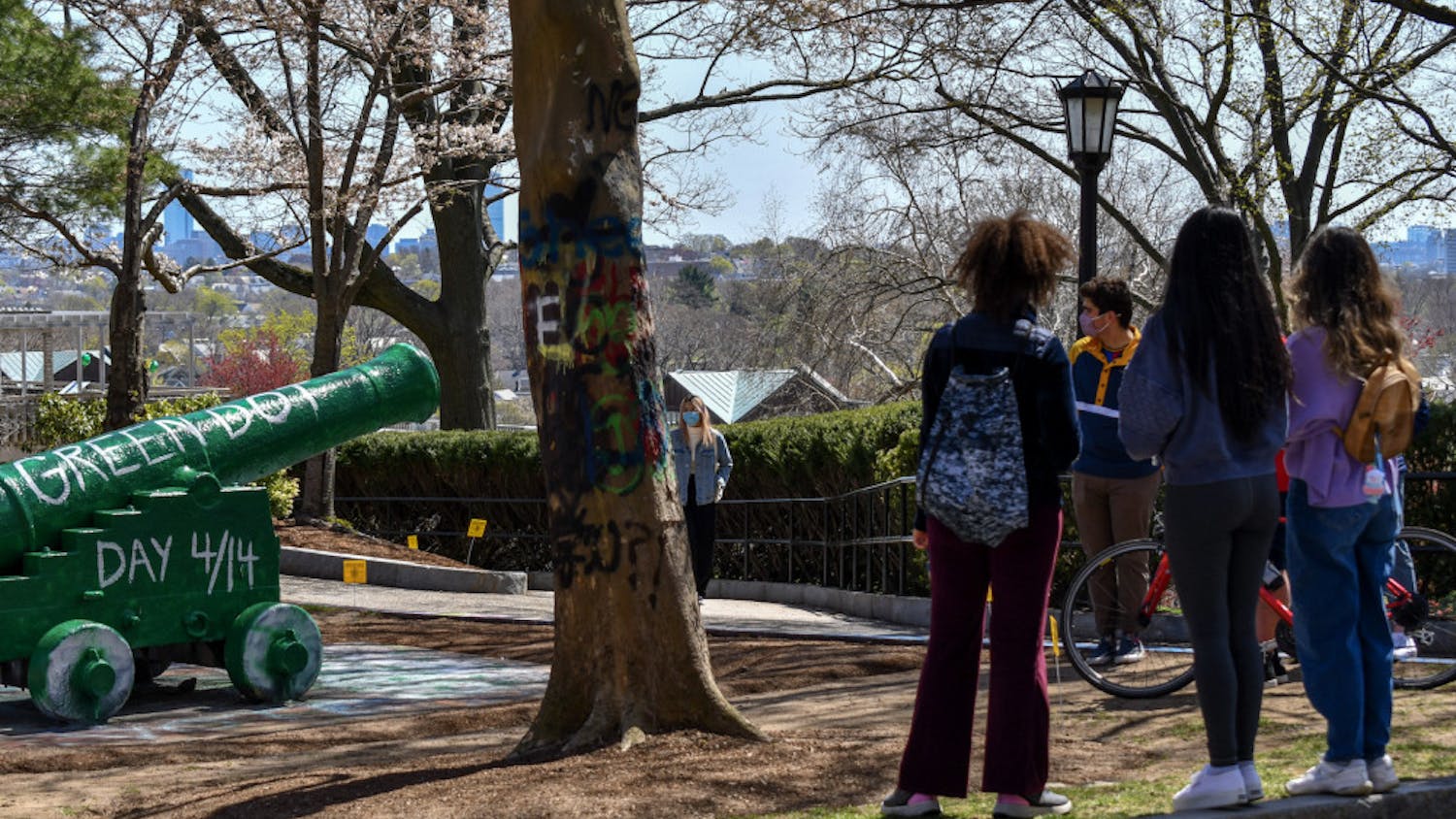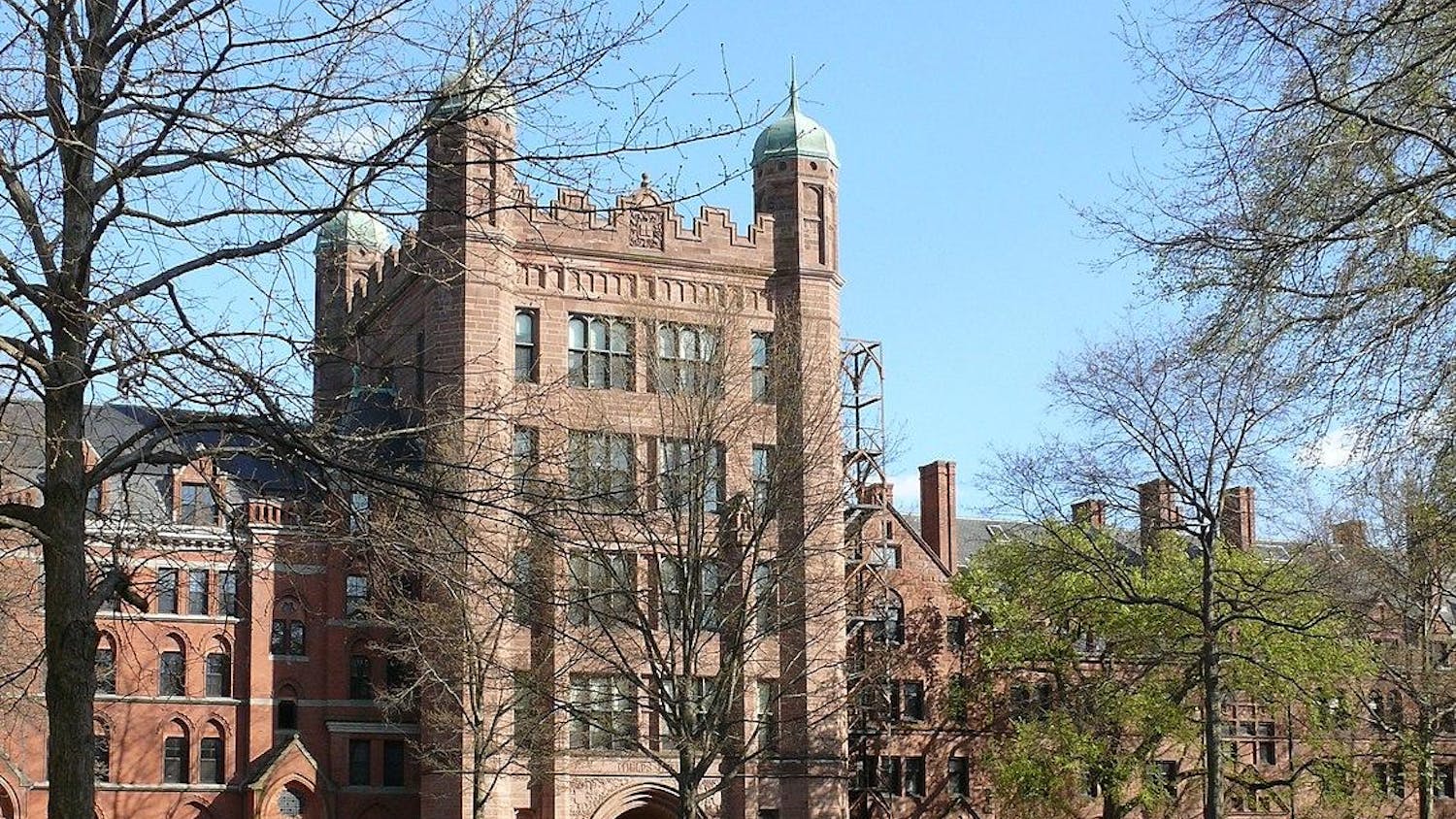Content warning: This article discusses sexual assault and other forms of sexual misconduct.
In a year of COVID-19 restrictions and mandatory social distancing, reports of sexual misconduct at Tufts increased, with students seeking support for more cases of sexual harassment, cyberstalking and domestic violence than previous years. Cases of sexual assault remained slightly below average, though administrators predicted that reported sexual assault incidents would rise in the coming months as campus reopens.
Students who experience sexual misconduct, which includes both sexual harassment and sexual assault, can find resources at Tufts primarily through the Office of Equal Opportunity and the Center for Awareness, Resources, and Education. OEO works with students who seek to report sexual misconduct at Tufts through a Title IX complaint or through the Sexual Misconduct Policy. CARE, a separate entity, is confidential and supports students impacted by sexual violence through counseling and connecting them with other resources.
Both offices reported similar patterns and changes in the students they supported and cases they managed this year, despite their different roles.
Rises and falls in reporting, seeking support
Both CARE and OEO saw a slight decrease in sexual assault complaints this year, but they expected that complaints might increase by the end of the semester to reflect the levels of a normal academic year.
Alexandra Donovan, the director of the CARE office, said that CARE saw very few students reach out for support for new sexual assault cases at the beginning of the academic year, an alarming shift from previous years.
“In a normal year, we get cases before the academic year has actually started, so for us to see very few, if any at all, until beginning to mid-October is alarming," Donovan said. "And that was not because it wasn't happening; it's because no one was reporting, and no one was reaching out for services.”
Simultaneously, the number of incidents of sexual harassment reported to OEO increased during the pandemic, which subverted expectations, according to Jill Zellmer, executive director of OEO. Most sexual harassment cases that made it to OEO took place online, including cases of cyberstalking. And most of the respondents that OEO addressed were not Tufts affiliates, leading OEO to collaborate more with TUPD when cases extended outside of OEO jurisdiction.
Additionally, both CARE and OEO said that cases of domestic violence skyrocketed after students were sent home in March 2020. Domestic violence cases have increased nationally under COVID-19 stay-at-home orders, but the increase in Tufts students experiencing domestic violence is much greater than the national average. Donovan said the CARE office has seen a 300% increase in cases of domestic violence and abuse since the pandemic reached Tufts.
She attributes this increase to the university’s abrupt closure last spring, which left many students desperate for housing options. Some moved home to dangerous family situations, while others, hoping to stay near campus, moved in with friends or partners, into situations that became abusive.
“Over the summer we had a lot of students who had to move back to campus just because their home lives were so dangerous,” Donovan said. “So that's a huge change and something that — I've been at Tufts, I guess, I'm finishing my seventh year — and I've never had something like that before this past summer.”
April is Sexual Assault Awareness Month, and Zellmer and Donovan expected that they would see an increase in reporting and students seeking support during that month, bringing the total cases of sexual assault reported in the 2020–21 academic year to levels comparable to previous years. As vaccines become accessible and the Tufts community prepares for the university to lift some COVID-19 restrictions in the fall, OEO predicts that sexual misconduct reporting will increase.
“We do believe we will see an increase in delayed reporting in the coming months (after most students are vaccinated) and we may also see an increase in same-semester reporting in the Fall,” Zellmer wrote in an email to the Daily. “Thus, we expect Fall 2021 will be a busy semester for sexual misconduct reporting with an increase in both delayed and same-semester reporting.”
Donovan also said that she’s seen more students revisiting CARE years after the event of an assault to process resurfacing trauma.
“I think that just speaks to the environment that we’re in,” Donovan said. “We have a lot more time to be aware of the calendar and the world, and fewer things to distract ourselves.”
Confusion around COVID-19 rules
One potential cause of the decrease in sexual assault reporting is confusion about what many students called “COVID amnesty”: how students who report sexual misconduct might be treated under university COVID-19 policy, which includes strict adherence to social distancing. Tufts’ COVID-19 policy includes the Pandemic Amnesty Policy, which excuses students from disciplinary action if they have safety concerns and cooperate with the Office of the Dean of Student Affairs and medical staff.
According to Zellmer, OEO provides amnesty for students who disobeyed COVID-19 policy and report, or who were involved in, sexual misconduct. CARE, as an anonymous service, also will not report students who break COVID-19 policy.
However, students still expressed confusion regarding how the amnesty policy was communicated in the first place, and whether it was made clear that it applied to situations of sexual misconduct.
Lee Romaker, who was a resident assistant in the fall semester, said that the Office of Residential Life and Learning explained the Pandemic Amnesty Policy to RAs as it applied to parties and contact tracing, but not sexual misconduct.
“I don't know if there's a similar policy for sexual assault; we didn't learn about that as RA," Romaker, an incoming Sex Health Representatives coordinator and rising junior, said. "That was not communicated to us.”
Paige Duff, the other incoming Sex Health Representatives coordinator, said that if the amnesty policy and how it applies to sexual misconduct was included in the mandatory first-year orientation, which she completed, it was only briefly mentioned.
“They put so much time into social media stuff about COVID, social media stuff about contact tracing, and I didn't see a single thing that was like, 'If you are at a party and something horrible happens to you, you will not be in trouble if you talk to someone about it,'” Duff, a rising sophomore, said. “I don't know if the implication was that people should have understood that, but I promise you that they didn't. That's not something that's intuitive for a [first-year] who's never been to this college campus before.”
Duff also said that the possibility of having to meet with administrators, as the amnesty policy outlines, could be a deterrent for reporting.
Elizabeth Cucuzzella, another rising sophomore and an incoming Green Dot coordinator, confirmed a sense of hesitancy to report sexual misconduct, especially among first-years. She said that the amnesty policy as it applies to sexual misconduct was not stressed to first-years until the spring semester.
“Most people that I've talked to don't even feel comfortable going to their RA with the issue, because they're like, ‘Oh no, I was breaking COVID rules,’” Cucuzzella said.
Under the COVID-19 policy, RAs were required to report their residents to the university if they broke social distancing rules, including inviting an intimate partner into their dorm room.
Josh Hartman, senior director of Residential Life and Learning, said that the COVID-19 amnesty policy was reiterated “clearly and at multiple points during training and throughout the semester” by RAs and the Office of Residential Life and Learning.
“Supervisors have continually reiterated that amnesty applies in several circumstances, and that concern about conduct action should not be a barrier to reporting,” he wrote in an email to the Daily.
But Donovan said that even if the COVID-19 amnesty policy as it applies to sexual misconduct was better communicated in the spring semester, deterrents to reporting earlier in the year still put students in danger.
“When you forget that saying this to keep public health safe puts these people in jeopardy, when those two hands aren't sort of working together, there's a real danger to that,” Donovan said. “And unfortunately that's what we saw in the beginning of the year.”
Further confusion around federal laws
Amid the confusion of COVID-19 amnesty laws, students who chose to report sexual misconduct faced another potential barrier. In May 2020, the United States Department of Education revised federal Title IX policy to narrow the definition of sexual harassment and limit universities’ ability to address misconduct that occurs off campus, outside the United States. and involving non-university affiliates.
“After an initial review, we are deeply disappointed and concerned; the regulations create new definitions, processes, and procedures that could reverse years of progress in addressing and preventing sexual misconduct on college campuses,” University President Anthony Monaco wrote in a statement to students after the policy was released.
In response, Tufts revised its Sexual Misconduct Policy over the summer to cover the gaps that the new Title IX policy left. In a year when sexual harassment has increased and many students were studying away from campus, OEO relied more on the Sexual Misconduct Policy, which, Zellmer said, has successfully maintained OEO’s jurisdiction.
“OEO has been able to maintain the levels of conduct our communities expect and we have been able to investigate matters that the new Title IX Policy does not require us to—by using our Sexual Misconduct Policy instead,” Zellmer said.
At the same time, Zellmer said that conducting formal investigations over Zoom rather than in person greatly increases the time and effort needed for each investigation, making the investigations “extremely difficult and elongated.”
Rethinking programming around prevention
The combination of the abrupt end of last spring semester, COVID-19 policies and the new Title IX policy left groups committed to preventing sexual misconduct scrambling to rewrite a year’s worth of programming in a precarious time. Groups like Green Dot and the Sex Health Representatives, both of which operate out of the CARE office, design their curricula around bystander intervention training and encouraging healthy sexual practices. In a year of unique social situations, both groups had to reinvision what sexual violence prevention looked like during a pandemic.
Green Dot, which normally focuses its student education around bystander intervention and sexual assault prevention at parties or large social gatherings, has shifted its focus to address the rise in domestic violence in the Tufts community. The organization’s trainings now address recognizing controlling behaviors that a friend or partner may be displaying, or recognizing if a friend or partner might be in an abusive relationship.
“The pieces that we felt were the most important for programming were relationships and pressure as one of our subtopics, and toxicity that we might not realize with those controlling behaviors, how people might be disrespecting boundaries,” Emma Seymour, an outgoing Green Dot coordinator, said.
The Sex Health Representatives are normally fixtures at orientation week in the fall, handing out condoms to incoming first-years. They moved their events to Zoom, but they said they had issues with consistent attendance and promoting candid conversations about sex in video-call format. And, with strict social distancing and mask rules in place, they were unsure if they could advocate for any kind of sexual contact between students without contradicting Tufts policy.
“[The university] didn't really acknowledge that it's college students — they're going to be having sex and you can't not talk about it because that doesn't help anything,” Brian Felton, an outgoing Sex Health Representatives coordinator, said. “Abstinence-only education doesn't work; it doesn't work during COVID, it doesn't work among high school students, it's just not an effective strategy.”
“It was difficult to find a balance this year, because our entire group is supposed to be advocating for sexual wellness in a time where the university was basically like, ‘None of that is okay right now,’” Duff said.
Next semester, as the university lifts COVID-19 restrictions, prevention groups like Green Dot and the Sex Health Representatives will be challenged with educating a student body eager to resume social life as in a normal year, even as many underclassmen missed out on their typical first-year programming.
“A lot of these underclassmen haven't even heard of Green Dot or they've never been to a real college party,” Malcolm Herbert, an incoming Green Dot coordinator, said. “These first-years and second-years have had such a strange and abnormal college life so far.”






